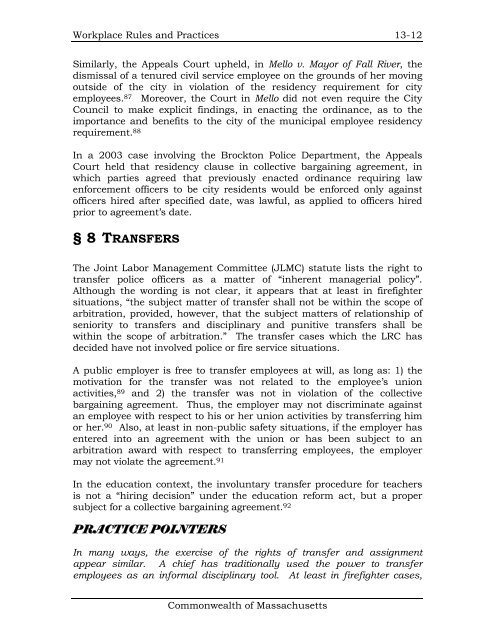Management Rights - AELE's Home Page
Management Rights - AELE's Home Page
Management Rights - AELE's Home Page
You also want an ePaper? Increase the reach of your titles
YUMPU automatically turns print PDFs into web optimized ePapers that Google loves.
Workplace Rules and Practices 13-12<br />
Similarly, the Appeals Court upheld, in Mello v. Mayor of Fall River, the<br />
dismissal of a tenured civil service employee on the grounds of her moving<br />
outside of the city in violation of the residency requirement for city<br />
employees. 87 Moreover, the Court in Mello did not even require the City<br />
Council to make explicit findings, in enacting the ordinance, as to the<br />
importance and benefits to the city of the municipal employee residency<br />
requirement. 88<br />
In a 2003 case involving the Brockton Police Department, the Appeals<br />
Court held that residency clause in collective bargaining agreement, in<br />
which parties agreed that previously enacted ordinance requiring law<br />
enforcement officers to be city residents would be enforced only against<br />
officers hired after specified date, was lawful, as applied to officers hired<br />
prior to agreement’s date.<br />
§ 8 TRANSFERS<br />
The Joint Labor <strong>Management</strong> Committee (JLMC) statute lists the right to<br />
transfer police oficers as a mater of “inherent managerial policy”.<br />
Although the wording is not clear, it appears that at least in firefighter<br />
situations, “the subject mater of transfer shal not bewithin the scope of<br />
arbitration, provided, however, that the subject matters of relationship of<br />
seniority to transfers and disciplinary and punitive transfers shall be<br />
within the scope of arbitration.” The transfer cases which the LRC has<br />
decided have not involved police or fire service situations.<br />
A public employer is free to transfer employees at will, as long as: 1) the<br />
motivation for the transfer was not related to the employee’s union<br />
activities, 89 and 2) the transfer was not in violation of the collective<br />
bargaining agreement. Thus, the employer may not discriminate against<br />
an employee with respect to his or her union activities by transferring him<br />
or her. 90 Also, at least in non-public safety situations, if the employer has<br />
entered into an agreement with the union or has been subject to an<br />
arbitration award with respect to transferring employees, the employer<br />
may not violate the agreement. 91<br />
In the education context, the involuntary transfer procedure for teachers<br />
is not a “hiring decision” under the education reform act, but a proper<br />
subject for a collective bargaining agreement. 92<br />
PRACTICE POINTERS<br />
In many ways, the exercise of the rights of transfer and assignment<br />
appear similar. A chief has traditionally used the power to transfer<br />
employees as an informal disciplinary tool. At least in firefighter cases,<br />
Commonwealth of Massachusetts
















